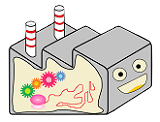Gifu/discussion-safety
From 2014.igem.org
| Line 22: | Line 22: | ||
</p> | </p> | ||
<h2><a name="scientist"></a>Viewpoint:SCIENTIST</h2> | <h2><a name="scientist"></a>Viewpoint:SCIENTIST</h2> | ||
| + | <p> In our project, we examined the use of Cadmium (Cd) and Zinc (Zn) to confirm whether the lengthened metallothionein combined with heavy metals. To use their metals safely, we discussed the potential dangers and how to treat them, with our team members and some professors.</p> | ||
| + | <p> First, Cd is harmful to living things, so one of our members anticipated giving damage to health of experimenters, causing pollution, and destroying ecosystem. But the damage to health of experimenters will not happen unless Cd enters the body through our mouths, and the pollution and the destruction of ecosystem do not happen when waste liquors are disposed following the standard rules, so there are no possible happening these problems.</p> | ||
| + | <p> Second, the lack of Zn causes the taste disorder, but on the other hand, excessive quantity of Zn is needed to cause symptoms of poisoning. So we considered that the dangers from Zn had almost nothing.</p> | ||
| + | <br> | ||
| + | <p> Now, experiments are conducted in consideration of safety, but the pollution from chemical materials may happen in the following cases:</p> | ||
| + | <br> | ||
| + | <p>In the case that…</p> | ||
| + | <ul><li>the polyethylene tanks to put the waste liquors into crack</li> | ||
| + | <li>waste liquors attach to tubes, tips, and the water to wash with something</li> | ||
| + | <li>disasters like earthquake happen (especially in Japan)</li> | ||
| + | <li>someone who do not know about our experiment touches chemical reagents in the same laboratory</li> | ||
| + | <li>desks or doors are touched unconsciously by the hands which have touched danger materials</li> | ||
| + | <li>the dangers or characteristics about chemical reagents such as the contents of kits are not understood</li> | ||
| + | </ul> | ||
| + | <br> | ||
| + | <p>To reduce the dangers in these cases, the following things are conducted in practice:</p> | ||
| + | <br> | ||
| + | <ul><li>the polyethylene tanks to put the waste liquors into crack<br> | ||
| + | →To prevent the waste liquors from flowing out to balcony or overflowing due to the rainwater, we set the trays under the tanks and store in covered containers.</li> | ||
| + | </ul> | ||
<h2><a name="artist"></a>Viewpoint:ARTIST</h2> | <h2><a name="artist"></a>Viewpoint:ARTIST</h2> | ||
<p id="space"> | <p id="space"> | ||
Revision as of 17:37, 17 October 2014




Safety
Safety discussion
Viewpoint
Viewpoint:SCIENTIST
In our project, we examined the use of Cadmium (Cd) and Zinc (Zn) to confirm whether the lengthened metallothionein combined with heavy metals. To use their metals safely, we discussed the potential dangers and how to treat them, with our team members and some professors.
First, Cd is harmful to living things, so one of our members anticipated giving damage to health of experimenters, causing pollution, and destroying ecosystem. But the damage to health of experimenters will not happen unless Cd enters the body through our mouths, and the pollution and the destruction of ecosystem do not happen when waste liquors are disposed following the standard rules, so there are no possible happening these problems.
Second, the lack of Zn causes the taste disorder, but on the other hand, excessive quantity of Zn is needed to cause symptoms of poisoning. So we considered that the dangers from Zn had almost nothing.
Now, experiments are conducted in consideration of safety, but the pollution from chemical materials may happen in the following cases:
In the case that…
- the polyethylene tanks to put the waste liquors into crack
- waste liquors attach to tubes, tips, and the water to wash with something
- disasters like earthquake happen (especially in Japan)
- someone who do not know about our experiment touches chemical reagents in the same laboratory
- desks or doors are touched unconsciously by the hands which have touched danger materials
- the dangers or characteristics about chemical reagents such as the contents of kits are not understood
To reduce the dangers in these cases, the following things are conducted in practice:
- the polyethylene tanks to put the waste liquors into crack
→To prevent the waste liquors from flowing out to balcony or overflowing due to the rainwater, we set the trays under the tanks and store in covered containers.
Viewpoint:ARTIST
 "
"